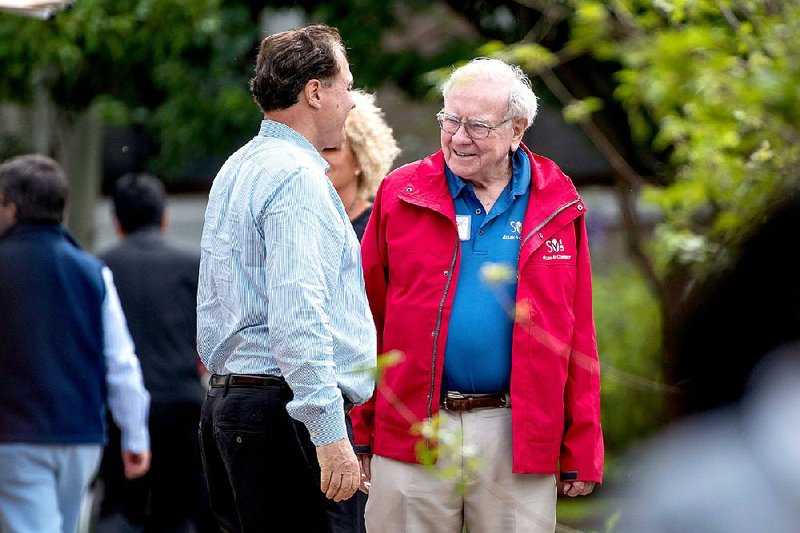Warren Buffett's Berkshire Hathaway Inc. has agreed to buy Precision Castparts Corp., the maker of equipment for the aerospace and energy industries, in a deal valued at $37.2 billion, including debt.
Buffett's firm will pay $235 a share in cash, the companies said Monday in a statement. That's 21 percent more than Friday's closing price for the Portland, Ore.-based company, which had dropped 17 percent in 12 months amid the slump in energy prices.
The deal is one of the largest by Buffett, who has been building his Omaha, Neb.-based firm in recent years with the acquisition of industrial companies such as Iscar Metalworking in 2006 and chemical-maker Lubrizol in 2011. It will also help work down a cash pile that climbed to more than $66 billion at Berkshire as of June 30.
"This is a business that's multidecade in nature," David Rolfe, who manages about $11 billion including Berkshire shares at Wedgewood Partners Inc., said of Precision Castparts. "They have these incredibly long relationships with some of their customers. And people aren't going to Fred's moldings or Fred's castings to get a little bit cheaper part on the inside of a jet engine."
The target company uses advanced engineering technology to make metal industrial components for jet engines and power plants as well as pipes for the oil and gas industry. It employs about 30,000 people and produced $2.6 billion of pretax operating income on $10 billion of revenue in its last fiscal year.
Precision Castparts said in July that it expects $10 billion to $10.4 billion in sales and an operating margin of about 27 percent in its current fiscal year, which ends in March. Last year, 70 percent of its sales were made to the aerospace industry, with another 17 percent going to the energy market. The company's customers include General Electric Co., Boeing Co. and Airbus Group SE.
"I've admired PCC's operation for a long time," Buffett said in the statement. "It is the supplier of choice for the world's aerospace industry, one of the largest sources of American exports."
Berkshire said the deal is expected to be completed in the first quarter of 2016, subject to regulatory approvals.
Berkshire will use about $23 billion of its cash for the deal and borrow approximately $10 billion, Buffett told CNBC. He said he plans to hold off from megadeals for about a year, because the company needs to make sure it still has plenty of cash on hand.
Precision Castparts Corp. pushes Berkshire further into heavy industry and cuts reliance on insurance and stock picking, growth engines for most of Buffett's 50 years in charge. Today's Berkshire, with BNSF Railway and renewable energy holdings, is vastly different than the mid-1990s when the Buffalo News and shoe businesses were prominent units and the company was considered a mutual fund because of its equity holdings.
"Those days are gone," Lawrence Cunningham, a professor at George Washington University and author of the book Berkshire Beyond Buffett, said in an interview. "It's really an industrial operation now."
Buffett also has shifted his equity portfolio, cutting back on some longtime holdings. Take the case of Procter & Gamble Co., the razor-maker that has long been closely associated with the billionaire and was his third-largest position at the end of 2008. Last year, he struck a deal to trade most of the stock back to Procter & Gamble in exchange for its Duracell battery business.
Buying companies with enduring prospects is "a different sort of buildup of value" than investing in stocks, Buffett, Berkshire's chairman and chief executive officer, told shareholders at his annual meeting last year. "We've moved into phase two."
In 2010, Buffett spent $26.5 billion in cash and stock for the portion of BNSF Railway that Berkshire didn't already own, valuing the railroad at $34 billion. Berkshire also agreed to take on about $10 billion of BNSF debt.
Jeff Matthews, an investor who has written books about Buffett, said it's unlikely that a purchase of Precision Castparts will work out as well as the railroad.
"It's night-and-day different from the BNSF acquisition," which was announced at a time when there was widespread concern about the economy, he said in an email. "Today there are no bargains like that.
"I just don't feel comfortable spending that kind of dough on that kind of business in this kind of market," said Matthews, adding that he was considering whether to sell his Berkshire stock.
Berkshire Class B shares slipped 13 cents to close Monday at $143.42. The stock had dropped more than 4 percent this year through Friday's close.
Buffett also backed the merger that created Kraft Heinz Co., and Berkshire said Friday in its second-quarter report that results for the three months ending Sept. 30 probably will include a pretax gain of about $7 billion tied to the transaction.
Insurance operations haven't fared as well lately, posting a net underwriting loss of $38 million in the second quarter, compared with a gain of $411 million a year earlier, driven by deteriorating results at the company's namesake reinsurance operation.
The billionaire, who will turn 85 on Aug. 30, told shareholders in May that reinsurance, in which the company takes on risks from primary carriers, has "turned for the worse." That's because hedge funds and other investors have piled into the industry seeking to add premium revenue for investment portfolios.
Information for this article was contributed by Michael J. Moore, Matthew Monks and Noah Buhayar of Bloomberg News.
Business on 08/11/2015
